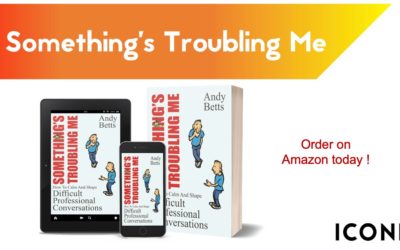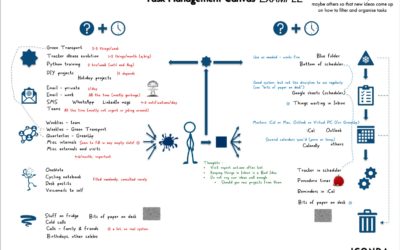In this video, I explore how artificial intelligence is removing the language barrier, changing the way we express, share, and even think about ideas.
I draw on personal experience — from the days of library research to the birth of the Internet and today’s AI revolution — to reflect on a key question:
We’ll look at:
🧠 The difference between ideas and the expression of ideas
💬 How AI is reshaping communication and unlocking potential
🧩 Why creativity and consciousness still belong to us
🤔 Essential questions you should ask about your future with AI
Key Moments
Introduction
From the library to the Internet
How AI is removing the language barrier
What is an idea?
Why AI still needs human meaning
The impact on work, coaching, and creativity
Questions for reflection
⸻ 👉 If you found this helpful, please:
• Like the video • Subscribe to my YouTube channel • Connect with me on LinkedIn
⸻ 👉 Full text:
Language is a coach’s main tool, and AI is essentially a language tool.
I’ve spent a lot of time experimenting with it and discussing how it can best be used with my clients.
In this video, I’d like to combine these experiences with insights from earlier in my career to share a perspective on the AI-driven transformation of communication.
I left home and went to university in 1978, when printed knowledge still ruled. Getting information meant going to the library, searching through shelves, and reading—really reading—to extract what you needed. The information was there, but it required effort and time to reach it.
About a decade later, I was back in university, managing IT systems at University College London’s Electronics Department. The Internet was just emerging, and even the weakest connections made it possible to exchange information far faster than before.
By the mid-1990s, it was clear that the Internet was a revolution. Information that once took days or weeks to find was suddenly accessible in seconds. The world had become smaller.
Still, despite this progress, language remained a barrier. You could find information on almost anything, but using it effectively was still a challenge. And if you wanted to put something out there yourself, you still had the work of crafting your message.
Turning an idea into something that others could grasp and use remained a human task.
Fast forward another 25 years, and AI has begun to remove that language barrier.
Machines can now not only find information but also transform an idea into a complete, coherent message. They can take a clear thought in any language—human or otherwise—and reproduce it in any other. Writing articles, presentations, and reports has become child’s play. Producing computer code is also less laborious, since the machine handles the structure and detail. Software engineers can now focus on the ideas expressed through their code.
This revolution removes a bottleneck that has held back countless people with great ideas. Many innovators have struggled not because their ideas were weak, but because they couldn’t express them clearly enough to gain traction. Now, AI systems can bridge that gap—turning raw ideas into messages others can understand and apply.
At this point, it’s worth asking: what is an idea?
An idea must have a human element. It’s not just new data or a clever combination of words. It’s a valuable or intriguing insight that brings together what’s already known into something that feels new—something that sparks curiosity, amusement, or understanding.
Until a machine has consciousness—and not just self-awareness in a technical sense, but genuine inner experience—it cannot truly have ideas. A computer will never wake up in the middle of the night thinking, “I finally understand what Vonnegut meant by ‘so it goes.’” Nor will it suddenly stop mid-sentence to exclaim, “I’ve got it! If I use carbon grease instead of the usual stuff, the seat post on my bike will stop sliding down.” These are examples of original ideas—and that’s what makes them human.
It’s a bit like mathematics. Computers can manipulate symbols and generate formulas, but until a human recognises insight in those formulas, they remain just data. The same goes for art or language. A machine can generate thousands of images or pages of text, but their value only appears when a human chooses the ones that resonate. The old joke about monkeys and typewriters fits perfectly here: given enough time, a lot of monkeys might reproduce all the works of Shakespeare.
An idea, by definition, only exists when a human mind sees something in it. Machines lack any sense of what it’s like to be alive in a physical, emotional, and biological world. They can associate, translate, and combine ideas logically—but that’s it.
So, why is AI such a big deal?
Even if machines still can’t produce original ideas in the human sense, the language-level breakthrough is a profound shift.
Work that once depended mainly on mastering language—writing, editing, formatting, preparing presentations, producing reports—suddenly has less value because machines can now do much of it.
This is a change by orders of magnitude. AI is reshaping writing as brutally as email replaced letters.
And this brings me back to coaching, because I’d like to end by asking you two questions that arise from all this:
• How much time do you spend creating new ideas compared with the time spent capturing and communicating them?
• And now that we can capture and communicate ideas faster than ever, how does that affect your future—for better and for worse?
Just one more…
From early writing to printing, to the Internet, and now AI, each leap has expanded our reach and accelerated human development. But how have these tools affected our collective wisdom, empathy, and harmony?
When the Internet emerged, many people hoped that fast, universal access to information would bring us closer together around shared truths and common sense. That hasn’t exactly happened—so perhaps we should be more cautious with our predictions this time around.
⸻ 👉 To go further:
📖 Something’s Troubling Me – my book on authentic communication and difficult conversations
🌐 More self-coaching tools: https://iconda.solutions
#ArtificialIntelligence #Communication #Coaching #AIandHumanity #Language #CriticalThinking #PersonalDevelopment #FutureOfWork #ReflectiveCoaching


